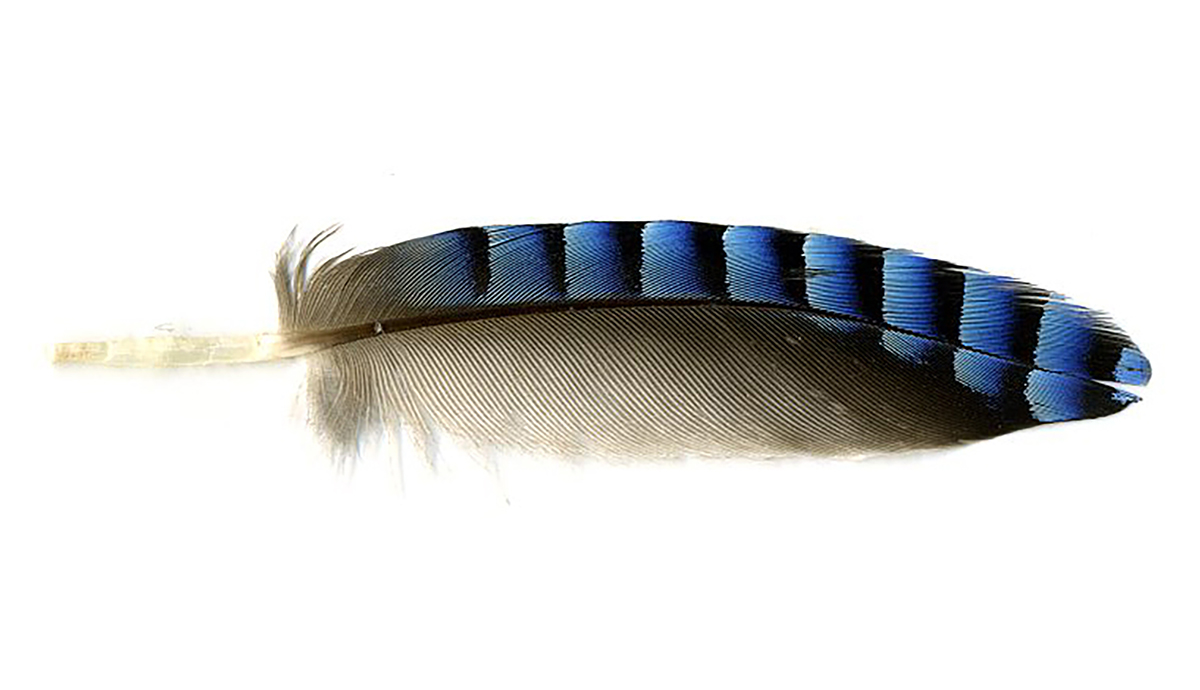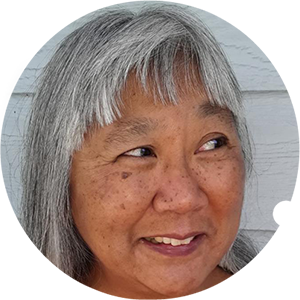Blue Jay Feather
Sachi didn’t want to hear her husband throw his fist against the wall again.
She’d been late coming home from her senryu poetry meeting; Hatsuji Wada had stopped her, nodding and bowing at the waist, complimenting her water imagery and how subtly a heron slid one raised foot into the tide. Sachi hoped Hatsuji hadn’t seen her blush; she’d kept her eyes focused on the tops of her scuffed black shoes. She hadn’t felt this way in a long time. Hatsuji had only one small criticism, much too minor to mention as he reached out and placed a thin blue jay feather across her palm. He only offered it because perhaps Sachi hadn’t thought about the possible other meanings for the word “feather” or “plume.”
Sachi glanced at her purse containing the gift in white Kleenex. The Buick that she didn’t like driving was making strange sounds again; the key had to be turned three times before it would catch. Always, she felt like a little girl sitting in the front seat, her right foot confusing the clutch with the brake. On Rainier Avenue, waiting for the traffic light to turn, a car full of teenagers had honked—three long blasts—because she hadn’t accelerated fast enough through the green light. Someone was judging her driving at every moment.
Mrs. Langer, the physical therapist, had been waiting. “Not a good day for Goro, I’m afraid. You know, he’s not that bad off. Of course, he doesn’t agree. But he’s too proud to change.” The white woman gathered her things: the funny half bicycle, several different-sized rubber balls, a length of cloth. “I know he’s frustrated and tired. But his brain needs to find new ways of doing things in order to start getting better.”
Sachi thanked Mrs. Langer over and over. She wished the woman would stay a few minutes longer so she wouldn’t have to face her husband. “Tea,” she offered. “You work so hard.”
Mrs. Langer straightened up from returning the coffee table to its place in front of the sofa. “I know you’re doing everything you can, Mrs. Iboshi. But Goro keeps using his left hand because it’s easier. I can’t even do massage because he doesn’t want me touching him. When I use the pain chart—the ten different stages—Goro just pushes it away.” Her hand on the doorknob, Mrs. Langer shook her head. “It’s not right for me to take your money when your husband isn’t trying to get any better.”
The back of Mrs. Langer’s white shirt disappeared into her car. Sachi swallowed; her mouth felt so dry. Maybe Goro was sleeping. It had been a year since the stroke: she’d made her voice softer, smaller when speaking to her husband. The only time she left the house was for picking up Goro’s medicines, buying groceries, and posting her bills. Twice a week for an hour, she met with eight other men and women to write senryu in the basement of the Ichiban restaurant. The other time was on Sundays when the group had a room at the Buddhist Temple, when she’d told Goro she was going to church.
The late afternoon sun narrowed into a thinning beam that winked out as Sachi closed the door. She knew she’d be depressed if she had to wake up inside a useless body every morning. Goro had come to the United States in 1904; he’d worked on the railroads. He cleared land of tree stumps with a mule and dynamite for only ten dollars. His posture had been erect, proud. Now he listed to the right; one side of his mouth drooped. He constantly drooled because he couldn’t feel the muscles in his face.
That’s when Sachi heard the loud thump, a smack against the wall.
What Sachi wanted most was to pick up the car keys from the pottery bowl in the living room. She wanted to slam the front door and drive away; it didn’t matter which direction. But Goro was her husband. She always came back. Nobody should run away from bad luck. She made herself take a step into their bedroom. “You have a good time with Mrs. Langer?” Sachi asked, picking up a magazine that had fallen to the floor.
Goro was lying on his side in bed. His right hand was flattened against the wall, all five fingers splayed. He was muttering to himself.
Sachi looked up from his hand to the clock. “Oh, time for your program. I’ll turn it on.” Her husband loved listening to Japanese game shows. That was one of the only times she heard him laugh. Actually, it was more of a series of hiccuping breaths. Their daughter had insisted on the stereo and fine-tuning it to the public broadcast station. “I’ll go start dinner. You must be hungry.”
As her knife sliced through a seeded cucumber for sunomono, Sachi thought her life was so much different from Hisa’s and Shizuko’s. It was good to get away from home, to hear other people’s voices. The last three meetings, newcomer Hatsuji had sat on her right. Last week, his son had brought him macadamia nuts from Hawaii. Hatsuji gave one small can each to the ladies in their group: Hisa, Shizuko, and lastly to herself. Goro had sucked the salt from a nut, rolling it from cheek to cheek, finally spitting it out. He couldn’t bite down.
Sachi pulled out the cold tofu soaking in a bowl of water from the refrigerator. With some sliced green onions and shoyu, it would be soft enough for her husband to chew. She set the table with cups and dishes, a spoon on a napkin for her husband, chopsticks for herself. Before the war, Goro’s dry goods store was prosperous. They had lived above the store with nice furniture and curtains; they had even sent their two daughters to school in Japan.
Why should there be anything wrong with looking well? Nothing was wrong with feeling good about getting together with friends, about not staying home all of the time.
She cocked her head, listening to the Japanese words she couldn’t quite make out. She could hear the bed creak. That meant Goro had at least tried to sit up. The huh-huh-huh sound of his laugh was so close to crying. Salting the cucumber, Sachi could feel the sting of a small cut on her index finger. There were things he couldn’t do, she reminded herself, but Goro wasn’t dumb.
Sachi tried to keep her mind busy. She’d had such a nice afternoon. Hatsuji had told a story about how he had seen a woman at Maruta’s fish store, placing a order for hamachi. Maybe it had been the way she turned her head, the back of her neck curving, rotating like a blue jay. “Mrs. Iboshi!” he had called out. Sachi had bent over, laughing into her right hand, imagining the surprise on Hatsuji’s face when he discovered it wasn’t her. It had taken Sachi a few moments before she realized that Hisa and Shizuko were only politely nodding their heads. Her friends kept glancing at each other, eyebrows raised.
Poor Hatsuji. He’d told her that his wife had died after a long illness just last March, just before their fortieth anniversary. His square face had looked more tired and drawn without its smile. A year ago, Goro had been driving the two of them to Shelton to look for matsutake; the smell of the pine mushrooms had filled the Buick.
From the hallway, Sachi could hear the toilet flush. The sound drowned out the voices of the Japanese host and his contestant. Sachi hoped that Goro hadn’t missed the toilet again.
Before she’d left home she had rummaged through her closet, trying on two different dresses, complaining about how much weight she’d lost before pulling on the birthday sweater her daughter had given her and pushing the sleeves up to her elbows. Sachi had touched her wrists and throat with a little Desert Flower toilet water. As she brushed her hair in front of her vanity, she had seen Goro’s reflection as he watched her. His dead right hand had hovered in the air, the index finger drooping. What did he need?
“Why,” he had said, then taken a breath before finishing, “you smile?”
Her wrist rubbed her itchy nose. She could still smell the scent, a little too heavy now because her face was so warm. Why should there be anything wrong with looking well? Nothing was wrong with feeling good about getting together with friends, about not staying home all of the time. Sachi had told him, he should come. Always, he’d answered with a low-throated, insulting “Nyah.” It was Goro’s fault they couldn’t go out together.
She knew his excuse. Always that weak right side. Back in Japan, there’d been a boy in her class. His left hand had been tied behind his chair to strengthen the right. She’d joined the entire class in his discipline, calling out “Right” whenever he’d raised the wrong arm.
Sachi dipped a finger into her tempura sauce to sample the seasoning. All her life, it seemed like she had only seen the back of her husband’s head as he loaded a truck or stacked produce and canned goods. “It’s all…right,” he’d drawn out the word, answering her fears about burglaries in the neighborhood. There’d been the times he paid more attention to a hakujin customer than to the kids, just tousling the tops of their heads before moving on. He had always been a hard worker. Smiling had been for special occasions—New Year’s and Christmas, graduations and birthdays and weddings. He didn’t smile well; his eyes looked more startled with whites showing all around the irises. Happiness for Goro was when he landed a steelhead or brought home oysters that she had to shuck. Not that he wasn’t a handsome man with a high forehead or that he hadn’t given her gifts of flowers or the special Mikimoto pearls on her 60th birthday. Lying in bed with him, she knew he sometimes woke in the early morning before the crows began their ratchet-like calls, and his right arm would thump up and down on the bed because he wanted to hold her hand.
It had been a while, Sachi thought, since she had squeezed back.
Now and then, when Shizuko or Hisa dropped by with fresh baked zucchini bread or extra plums from their trees, they would look at Goro and shake their heads. Sachi could see what they didn’t say with their tight-lipped mouths—so glad it isn’t me.
The radio had gone on to playing rock ’n’ roll music. She could hear the tune from a song called “Sukiyaki” that she knew Goro didn’t like. “Papa?” Sachi called, wiping her hands on a dish towel. When she realized that she couldn’t hear anything familiar, she hurried down the hall, only stopping outside of the bedroom to peer in.
Her husband was struggling on the floor, the right arm pinned under his chest. He couldn’t even crawl. He kept trying to push up, only to fall back down. She put her shoulder under Goro’s armpit, thinking how one of the first actions a baby on its stomach learned was how to flip over.
“What were you looking for?” she asked, helping to prop him up again the wall. Her husband’s arms and legs flailed, sticking out in all directions like an untidy bundle of firewood. With a huff, she collapsed beside him. “Nani?” she asked again, glancing at the floor.
What had lain beneath him was her purse. The zipper was wet; Goro must have used his teeth and left hand to open it. She imagined him wrestling with the strap and fake leather.
There was her wallet, loose change and credit cards, stamps and receipts scattered across the carpet. Sachi felt exposed. Had Goro read her notes, the scribbled bits of senryu in the white spaces of her grocery lists? Three weeks ago, she had put Hatsuji’s address and phone number in the bottom drawer of her jewelry box. Pulling her skirt over her knees, she thought how determined her husband must have been.
Then Sachi saw the feather at the farthest edge of the spill. Sunlight struck the dark shades of blue in the vanes slanting out from the shaft. As Sachi stretched her arm to reach it, Goro slid into her side.
His face settled onto the ledge of her shoulder. “Me, you—not right,” he breathed through the side of his mouth into her sweater.
With tentative strokes, Sachi’s fingertips began to brush Goro’s hair out of his eyes. “Remember, the first time I saw Seward Park in the spring? Just married, I was so lonely. Mother, father, sisters—all back in Japan. But the cherry blossoms along Lake Washington! Soft, pink. Petals fell everywhere. You so handsome in white shirt, black suit.” Sachi took Goro’s cold hand in hers, and lied: “Blue jays flew there.”
Recommended
The Monstera
The Wild Women of Brigantine
The Salamander






